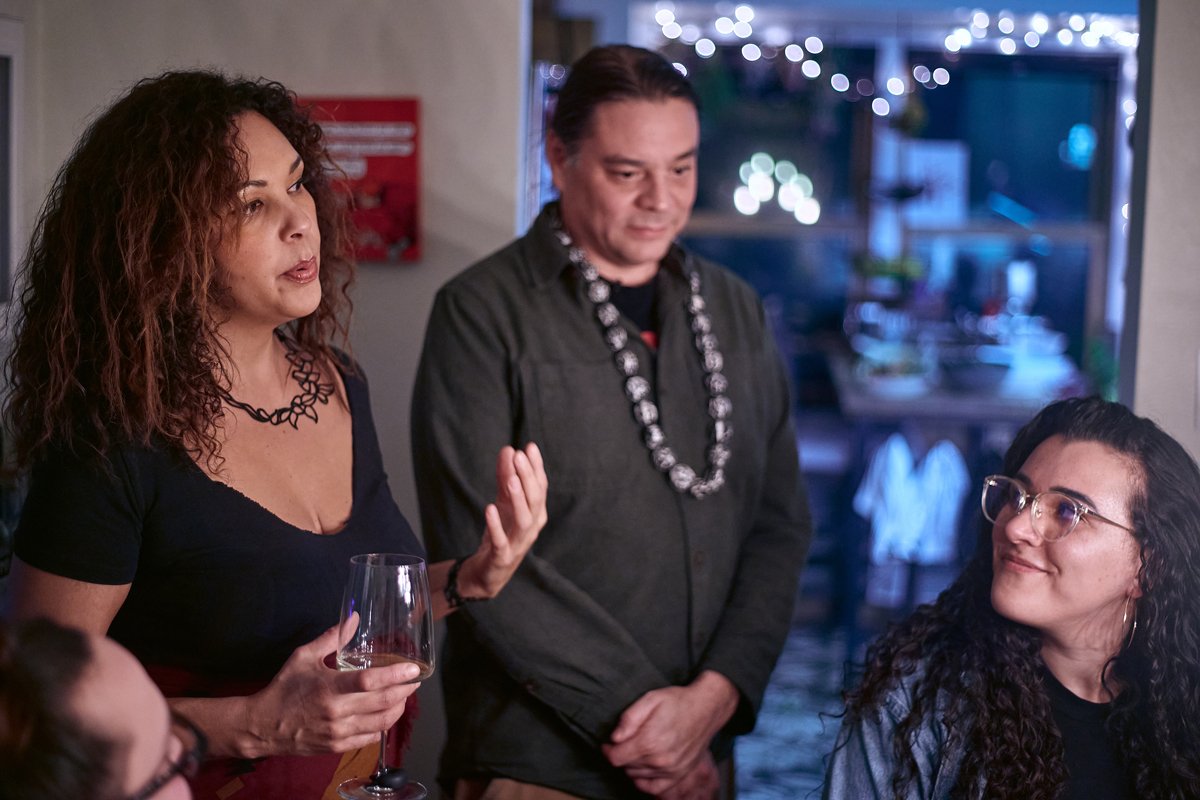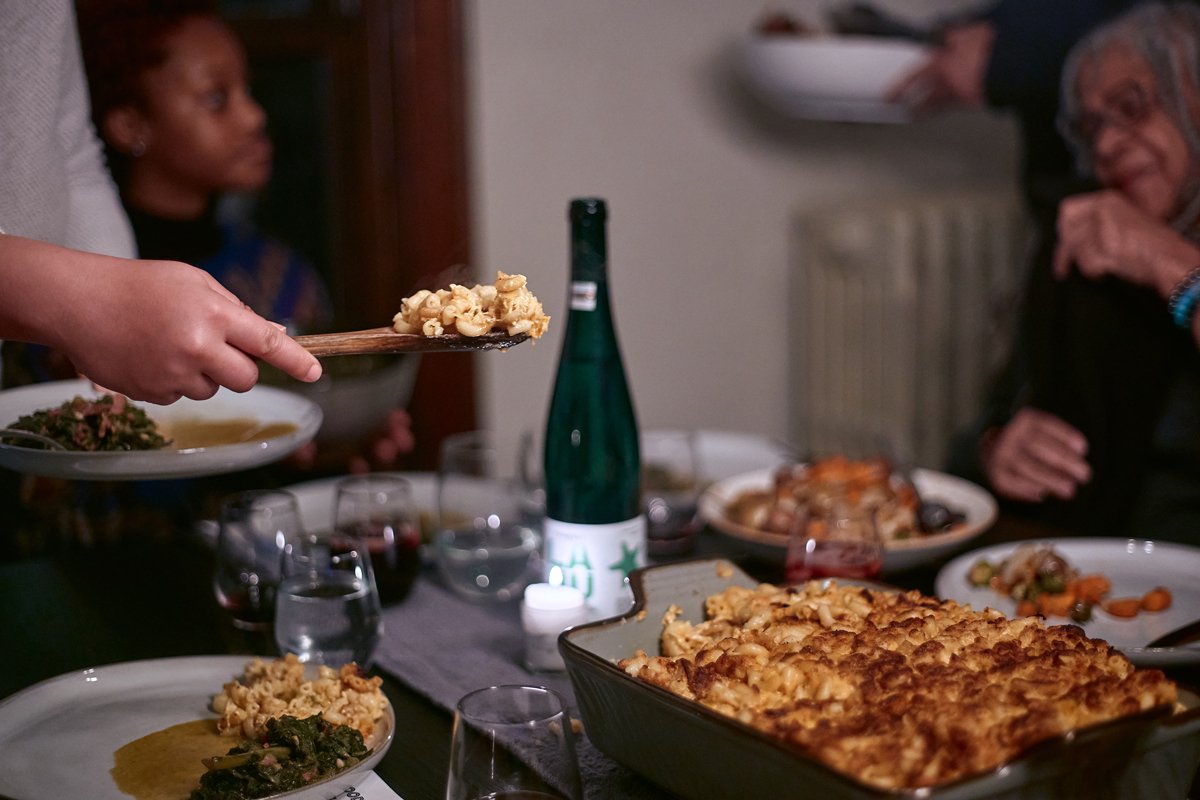Chef Sean Sherman and food writer Mecca Bos have launched a new nonprofit to bring together people of color and their white allies to share meals, recipes, and stories of resistance.

Chef Sean Sherman and food writer Mecca Bos have launched a new nonprofit to bring together people of color and their white allies to share meals, recipes, and stories of resistance.
April 25, 2023

Chef and food writer Mecca Bos (left) and Native American chef Sean Sherman (center) launched the BIPOC Foodways Alliance to preserve and share food stories from communities of color. They recently hosted their first communal dinner to celebrate different cultural approaches to cooking and sharing food. (Photo credit: Uche Iroegbu)
On a Monday night in January, a dozen people gathered around a dining table in the warm Minneapolis home of acclaimed Native American chef Sean Sherman and his life partner, Black chef and food writer Mecca Bos. The guest list for the dinner, the first in a series of events put on by the BIPOC Foodways Alliance, a new organization from Sherman and Bos, represented a mini melting pot of sorts, all of us from diverse racial backgrounds and various walks of life—media makers, public servants, and others you might not expect to find at a foodie fete like this.
Although we didn’t know quite what we were in for, there was a palpable energy in the room, because we were all there for a shared purpose: to help dismantle white supremacy through food—macaroni and cheese, to be precise.
After brief intros, Carolyn Holbrook and her granddaughter Tess Lee invited us to taste their family’s baked mac ‘n’ cheese recipe alongside roasted chicken, collard greens, honey cornbread, and sweet potato pie. While we ate, they led a casual discussion about what the meal means to so many Black communities. The dish—which was brought to the U.S. in the 18th century by James Hemings, a mixed-race, Paris-trained chef born into slavery who served as Thomas Jefferson’s head chef—has since become a popular food served at family celebrations in Black communities across the South and beyond.
At the dinner, Holbrook talked about being her family’s designated mac ‘n’ cheese bearer at holiday gatherings and explained that the role is an exalted one passed down through the generations. The conversation was illuminating and intimate, but it never felt forced or overly didactic. Instead, it was like a sacred meal shared with loved ones.
I savored every word along with each bite of macaroni and cheese. Afterward, we all toasted over mezcal and shared laughs watching TikTok videos that jest at the significance of mac ‘n’ cheese for Black families. At that moment, I realized just what a rare experience it was to be granted access to another culture’s traditions in such a warm, intimate way.

Baked mac ‘n’ cheese is served alongside roasted chicken, collard greens, honey cornbread, and sweet potato pie. (Photo credit: Uche Iroegbu)
That’s the goal of the BIPOC Foodways Alliance. Sherman—who was just named one of TIME’s 100 Most Influential People of 2023—has been in the news a great deal in recent years as his Native-focused restaurant, Owamni, has gained notoriety and won awards. But he and Bos know all too well that this attention comes after a long stretch when diverse voices were all but completely left out of the mainstream dialogues around food. That’s why the duo has set out to preserve, protect, and uplift food stories from the vast diaspora of BIPOC people across America through communal dinners like this.
“For people of color, there’s so much commonality in American history due to colonization and slavery, so we thought, why not invite everybody to the literal table to celebrate these diversities?” said Sherman in an interview after the event. “There are still so many barriers for people of color, especially in the food world. We wanted to create a space to bring people together to share their recipes, stories, and struggles, and to help people understand other cultures.”
“Dismantling white supremacy will not be easy, but we believe that bringing all BIPOC people together using food as the catalyst is a step in the right direction.”
This ambition is closely aligned with Sherman’s mission to revitalize Native American foodways through the decolonized fare served at Owamni as well as the efforts of his nonprofit, North American Traditional Indigenous Food Systems, and the Indigenous Food Lab, a training kitchen for Native American culinary entrepreneurs. Bos, who worked in the kitchens of several lauded Twin Cities eateries, has been amplifying the stories of marginalized peoples through her reporting for Minnesota Public Radio and other outlets.
In short, they have witnessed the inner workings of the food world and are uniquely positioned to help bring about change.
Unlike typical culinary incubators, the BIPOC Foodways Alliance isn’t designed to help aspiring chefs gain credibility or expertise. Instead, it’s built on the premise that everyone has a food story to tell, even if they don’t have a restaurant or a platform. With official nonprofit status currently in the works, the organization hopes to promote cross-cultural understanding by telling the unheard, underrepresented food stories of elders, immigrants, and other often-overlooked individuals who hold deep culinary knowledge.
For now, that translates to free monthly communal dinners held at Minneapolis’s Glass House event venue, made possible thanks to community fundraising.
Bos said the idea for the alliance actually stems from a joke between she and Sean in which they often say, “All we have to do is dismantle white supremacy.” And while, in reality, it’s an ambitious goal, she sees the dinner series as an important first step.
“Dismantling white supremacy will not be easy, but we believe that bringing all BIPOC people together using food as the catalyst is a step in the right direction. You only need to look at Sean’s work to see how powerful a tool food can be. It shows that when you bring people together, you only get stronger. I would love to see more folks lifting each other up in a tangible way,” says Bos, who will run the nonprofit until there is funding to hire a director. There’s a resonance about this notion of joining forces, understanding each other, and working toward the common goal of dismantling white supremacy.
And while these intimate meals are at the heart of their initiative, Sherman and Bos hope its reach stretches beyond those who will be sitting at the table. The dinners will be documented and disseminated online in an effort to make them more accessible while also helping document different cultural approaches to cooking and sharing food—many of which are often passed down orally and therefore stand to be lost. Sherman and Bos are also exploring the idea of creating media to accompany the meals, such as a recurring zine, a podcast, and even a possible book. Of course, all of these efforts are contingent on ample funding, a key focus for 2023.
So far, the Twin Cities community has been enthusiastic about the nonprofit’s recent launch, with hundreds of supporters in attendance at a February fundraiser.
“For me, the work of the BIPOC Foodways Alliance is personal,” says writer Natalia Mendez, who was in attendance. “When both sides of my family came here from Mexico, they faced oppression for their accents and skin color. They didn’t teach their kids Spanish, which closed off some access to our culture, but they retained some traditions. Food is one of the most important pieces of our culture we still have access to. I know what it’s like to look for that cultural access in an effort to decolonize the self, so when I heard about the fundraiser, I knew I had to attend. The event was multigenerational and celebratory, and I was so happy to see an incredibly diverse crowd.”
The duo also has their sights set on larger national—and even global—impact. “Food touches all of us, and there are so many people out there holding these really important food stories,” Sherman says. “As Mecca and I travel, we’re finding all these interesting BIPOC initiatives happening in various cities. We’re hoping we can do this not just in Minneapolis, but all over the world.”
That future involves collaborating with similar organizations around the country, cohosting events in other destinations, and helping establish BIPOC Foodways Alliance chapters across the globe. The initiative will soon be getting some time in the spotlight, thanks to an upcoming dinner in early May at the James Beard Foundation’s new Platform culinary arts center in New York City. And later that month, the organization will take part in the George Floyd Global Memorial Celebration, with special culinary storytelling to take place at a Paisley Park gala featuring Floyd family recipes.
Even with these high-profile partnerships, the focus always comes back to creating space for people of color to share their own food stories. “The culinary world has been very Eurocentric for way too long, and historically we’ve seen a lot of recipes interpreted through this perspective,” says Sherman. “We’ve seen many white chefs become very famous for making other cultures’ foods feel safe and accessible for white people. It’s time to step back and let people of color tell their own stories.”
Bos is quick to point out that white allies play an important role in this effort, too. “We can’t afford to dismiss white allies,” she says. “To be frank, some of my white allies have been more supportive than some BIPOC people, probably because they understand their privilege and typically have access to more resources.”
So, what does success look like for BIPOC Foodways Alliance in year one? Sherman encompasses it in a single word: curiosity. He wants to see a world where more people stretch beyond their own identities, engage with different cultures, and stop seeing other foodways, traditions, and customs as foreign—a set of concepts he has long been championing when it comes to Native American foods.
He and Bos acknowledge they might not see this objective achieved within their lifetimes and that this effort will require more than just the two of them, as Bos explains: “Do Sean and I expect to dismantle white supremacy single-handedly? Absolutely not. Can a powerful legion of people of color make a mighty stand against racism? Yes.” That’s why they’re willing to put in the work, despite the odds.
“In this moment, just as we’re having this reckoning about the plight of people of color in this country, white supremacy is doubling down,” Bos says, alluding to the gun violence against people of color as well as voter suppression, book bans, and other policy efforts enacted by Republican lawmakers across the country.
“But we really are a minority-majority country, and I believe the only way to tackle the issue of white supremacy is for all people to come together,” she says. “After all, if something can be built, it can be dismantled.”

October 9, 2024
In this week’s Field Report, MAHA lands on Capitol Hill, climate-friendly farm funding, and more.
October 2, 2024

October 2, 2024

October 1, 2024

September 30, 2024

September 25, 2024

September 25, 2024

Like the story?
Join the conversation.